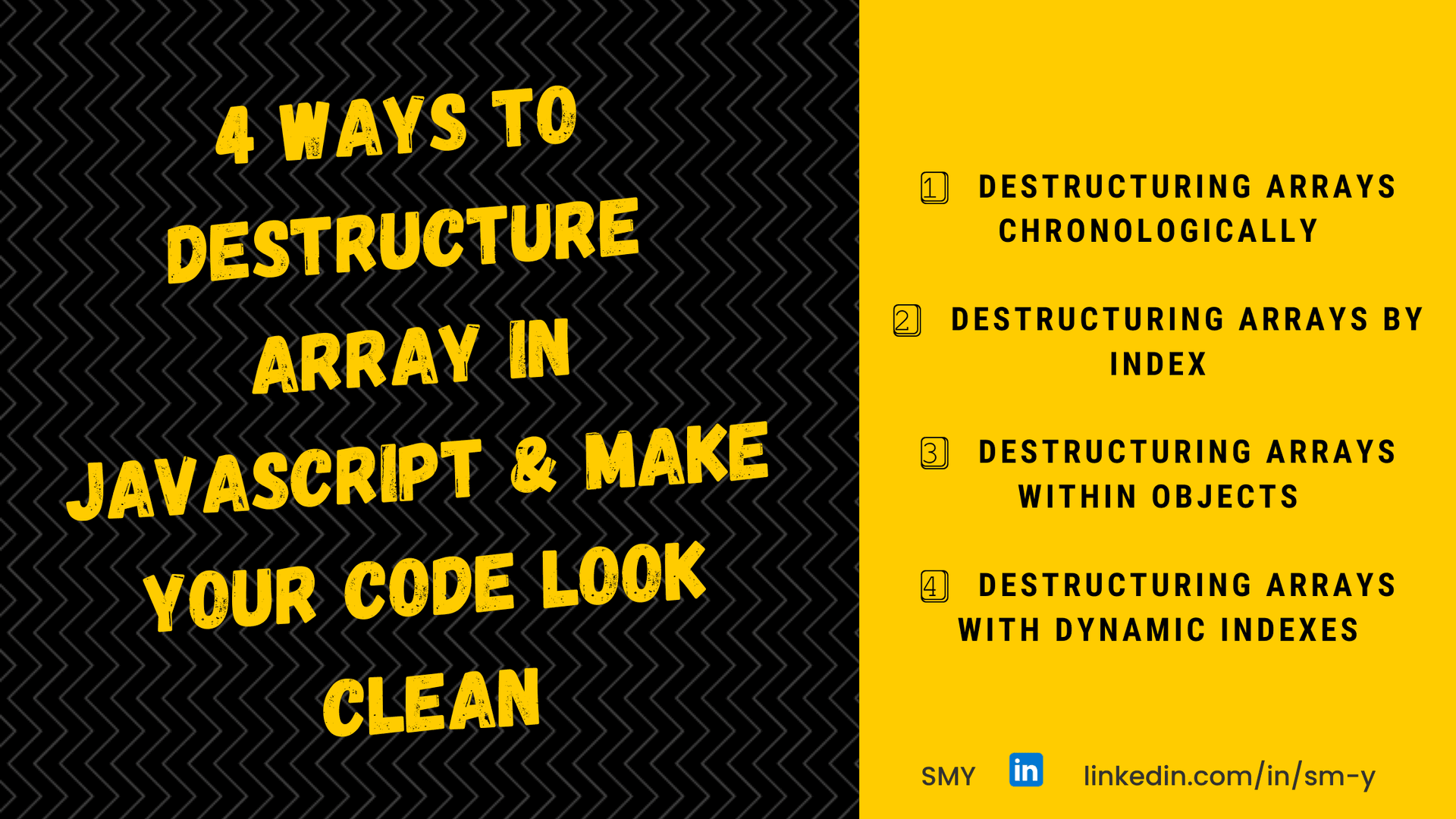Helloooooooo! 🎉
I hope you're doing awesome! This is SMY! 👋 Today, we're diving into some cool JavaScript magic with array destructuring! 🚀
📜 Contents:
⚡ Wait What?
Array destructuring is a neat feature in JavaScript that allows you to extract values from arrays (or properties from objects) into distinct variables. It’s not just for making your code look cool, it’s about writing cleaner, more readable code. Let’s break down how you can destructure arrays in different ways!
⚡ But Why?
Destructuring makes your code more concise and expressive. Instead of accessing array elements by their indices, you can directly extract the values into variables. This can simplify your code, reduce errors, and make it easier to understand.
⚡ But How?
Let’s walk through each method of array destructuring with some examples!
1️⃣ Destructuring Arrays Chronologically
This is the most straightforward way to destructure arrays. You match variables to array elements in the order they appear.
const fruits = ['apple', 'mango', 'banana'];
const [apple, mango, banana] = fruits;
console.log(apple); // apple
console.log(mango); // mango
console.log(banana); // banana
How It Works:
-
The
fruitsarray contains three elements. -
Using
[apple, mango, banana], we destructure the array into three variables, each corresponding to an element in the array, in the same order.
2️⃣ Destructuring Arrays by Index
In JavaScript, you can't directly destructure arrays by index within the array literal itself, but you can achieve similar results with a little workaround using Object.entries or by manually setting values.
const fruits = ['apple', 'mango', 'banana'];
const {0: apple, 1: mango, 2: banana} = fruits;
console.log(apple); // apple
console.log(mango); // mango
console.log(banana); // banana
How It Works:
- Here, we use a syntax that mimics destructuring by treating array indices as keys. This is more of a workaround since destructuring by indices isn't directly supported, but the idea is to align array elements with variables through indices.
3️⃣ Destructuring Arrays within Objects
You can also destructure arrays that are nested within objects. This allows you to target specific elements in nested structures.
const fruitsPerSeason = {
summer: ['grapes', 'pineapple'],
winter: ['kiwis', 'oranges']
};
const { summer: [grape, pineapple], winter: [kiwi, orange] } = fruitsPerSeason;
console.log(grape); // grapes
console.log(pineapple); // pineapple
console.log(kiwi); // kiwis
console.log(orange); // oranges
How It Works:
-
fruitsPerSeasonis an object where each property is an array. -
By destructuring within the object, we extract specific elements from these arrays into distinct variables.
4️⃣ Destructuring Arrays with Dynamic Indexes
For a more dynamic approach, you can combine destructuring with variables that hold indices.
const fruitsPerSeason = {
summer: ['pineapple', 'grapes'],
winter: ['kiwis', 'oranges']
};
const pineappleIdx = 0, kiwisIdx = 0;
const { summer: [_, pineapple], winter: [_, kiwis] } = fruitsPerSeason;
console.log(pineapple); // pineapple
console.log(kiwis); // kiwis
How It Works:
- Here, we’re using
_as a placeholder to ignore the first elements and destructure only the elements we need based on dynamic indices (though indices themselves aren't dynamically used in this example).
Wrapping Up:
Destructuring arrays can streamline your JavaScript code, making it cleaner and more expressive. Whether you're extracting values chronologically, targeting specific indices, or working within objects, these techniques help you handle arrays more efficiently.
That’s it, folks! Hope you found this breakdown of array destructuring helpful and insightful. 🚀
Feel free to follow me on GitHub & LinkedIn for more JavaScript tips and tricks!
Stay awesome and happy coding! ✨


